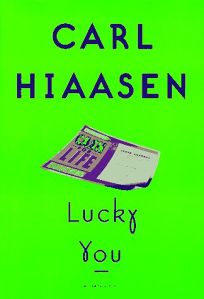When Hijinks Last
in the Dooryard Bloom’d
Appeared in the Orlando Sentinel, 1997
Here’s the setup for Carl Hiaasen’s new book:
Spunky and environmentally aware young black woman wins Florida lottery; shares winnings with moronic pair of white supremacists; hijinks ensue.

Of course that doesn’t do the book justice, but come on — what more encouragement do you need?
We can count on few things in this world, but Carl Hiaasen is one of those things. Hiaasen has become as trustworthy as … as … well, no one this side of Captain Kangaroo seems reliable anymore. But every other year, we can count on Hiassen to deliver a book both hilarious and thoughtful.
Lucky You does not disappoint. In fact, it may be the funniest book he’s written. And that’s saying a lot.
JoLayne Lucks is the appropriately named woman who picks her usual numbers (each selected for an age at which a man broke her heart) at the Gas’n’Go in little Grange, Fla., and wins big one Saturday night. She immediately knows what to do with the money: buy the fragile land on which developers plan to build another hideous strip mall, upsetting the balance of wildlife, including its entire cooter population. (As an interim step, she had taken the turtles into an aquarium in her home. They whomp down lettuce like a league of vegetarians at an organic-produce convention.)

But two South Florida slimeballs named Bode and Chub, using the non-scientific approach to the lottery (a quick-pick), also get lucky. When they get wind of JoLayne’s luck, they head north, find the dim-witted Gas’n’Go clerk that sold her the ticket, find out where JoLayne lives, and knock her around until she gives them the ticket. She won’t give it up at first, so they plug one of her turtles to get it. Bode and Chub lead (and provide the entire membership of) the White Rebel Brotherhood, their racist version of the Keystone Kops. But they pose no threat to anyone other than their own chowderhead selves. To call them dumb is an insult to all of the honest, hard-working dumb people in the world.
A reporter assigned to file a trite article about a woman named Lucks getting lucky instead becomes her partner is trying to track the idiot thugs, as Bode and Chub charge hundreds of dollars to JoLayne’s stolen credit cards, most of the tab run up at a particular Hooters, where the waitress bears a startling resemblance to Kim Basinger, Chub’s dream woman.
Tom Krome is too good a reporter for the newspaper that employs him, and his editor knows it. In fact, the editor lives in fear of his star and romantically-challenged writer. The editor dispatches Krome to Grange, the Weeping-Madonna-Shrine capital of Central Florida, hoping for a paint-by-numbers feature story. Krome goes along because the assignment provides a convenient escape from his troubling relationship with a married woman (she’s married to a vindictive judge, no less). But he finds more than plastic Mothers of God and phony stigmatas in Grange. He finds JoLayne Lucks, a woman with the power and capacity to change his life.
The book is rich and satisfying. Even the tangential characters have nuance. It’s a busy plot, but there is nothing in the book that can be dispensed with. It all builds toward the sort of schizophrenic conclusion for which Hiaasson has become known. We’re left both laughing and crying. No one writes comic tragedy like Hiaasen. (Does anyone else even try?)
Hiaasen shows again his gift for blending the sacred and the profane, weaving a dead-serious-apocalyptic theme around a comic tale worthy of the best absurdist.
As always, Hiaasen’s writing appears smooth and effortless, which he probably worked his quick- pick off to make it appear so. Every page contains a half-dozen classic lines and his laconic throwaways will render the book’s readers into outcasts. They will become those people who grab friends and loved ones by the collar and read whole scenes aloud. The book is so fertile – who else would concoct a minor plot development around a musical version of Silence of the Lambs ? – that it’s easy to miss some of his brilliant asides. Other writers should be so lucky as to live off of Hiaasen’s scraps. There’s enough here to feed a battalion of starving novelists.
